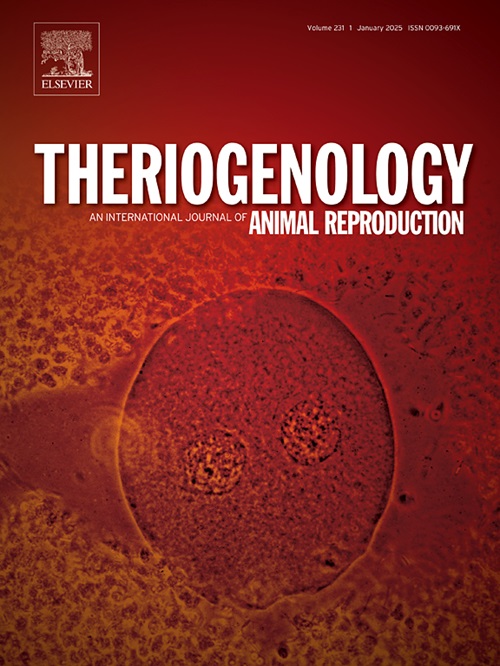Nuclearporin subcomplex Nup98/Rae1 is vital for maternal-to-zygotic transition during early embryonic development
IF 2.5
2区 农林科学
Q3 REPRODUCTIVE BIOLOGY
引用次数: 0
Abstract
The Nup98/Rae1 nuclear pore subcomplex, a critical mediator of nucleocytoplasmic transport, orchestrates fundamental cellular processes including transcriptional regulation, mRNA surveillance, and mitotic fidelity. However, its functional significance during early embryogenesis remains incompletely understood. In this study, we employed an in vitro embryo culture system combined with embryo electroporation-mediated interference to investigate the role of Nup98/Rae1 in early mouse embryos. Our results revealed that Nup98/Rae1 deficiency led to delayed embryonic progression and a significant decline in blastocyst formation rates. Transcriptomic analysis using SMART-seq2 in two-cell stage embryos revealed that Nup98/Rae1 modulates global gene expression, particularly within pathways governing RNA splicing, protein catabolism, and the DNA damage response. Integration of transcriptomic data with established databases further confirmed that Nup98/Rae1 is indispensable for zygotic genome activation and maternal mRNA clearance—key events in the maternal-to-zygotic transition. Moreover, quantitative immunofluorescence analysis demonstrated that loss of Nup98/Rae1 resulted in heightened DNA damage and reduced H3K27ac levels. Additionally, the increased mRNA expression of apoptosis-related markers BAX and CASPASE3, alongside positive TUNEL staining, indicated the induction of early apoptosis. Immunostaining for Sox2 and Cdx2 revealed a defective inner cell mass development, highlighting the detrimental impact of Nup98/Rae1 on cell fate specification. Collectively, these findings indicate that Nup98/Rae1 deficiency disrupts maternal mRNA degradation, impairs zygotic genome activation, alters histone modifications, induces genomic instability, and ultimately compromises early embryonic development by triggering apoptosis.
核孔蛋白亚复合物Nup98/Rae1在胚胎早期发育过程中对母细胞到合子细胞的转变至关重要
Nup98/Rae1核孔亚复合物是核胞质运输的关键介质,协调基本的细胞过程,包括转录调节,mRNA监视和有丝分裂保真度。然而,其在早期胚胎发生中的功能意义尚不完全清楚。在本研究中,我们采用体外胚胎培养系统结合胚胎电穿孔介导的干扰来研究Nup98/Rae1在早期小鼠胚胎中的作用。我们的研究结果显示,Nup98/Rae1缺陷导致胚胎发育延迟和囊胚形成率显著下降。在两细胞期胚胎中使用SMART-seq2进行转录组学分析显示,Nup98/Rae1调节全局基因表达,特别是在控制RNA剪接、蛋白质分解代谢和DNA损伤反应的途径中。转录组学数据与已建立的数据库的整合进一步证实,Nup98/Rae1对于合子基因组激活和母体mRNA清除(母体向合子转变的关键事件)是不可或缺的。此外,定量免疫荧光分析表明,Nup98/Rae1缺失导致DNA损伤加重,H3K27ac水平降低。凋亡相关标志物BAX和CASPASE3 mRNA表达增加,TUNEL染色阳性,提示早期凋亡的诱导。Sox2和Cdx2的免疫染色显示了细胞内团发育的缺陷,突出了Nup98/Rae1对细胞命运规范的有害影响。总的来说,这些发现表明Nup98/Rae1缺陷破坏母体mRNA降解,损害合子基因组激活,改变组蛋白修饰,诱导基因组不稳定,并最终通过触发细胞凋亡而损害早期胚胎发育。
本文章由计算机程序翻译,如有差异,请以英文原文为准。
求助全文
约1分钟内获得全文
求助全文
来源期刊

Theriogenology
农林科学-生殖生物学
CiteScore
5.50
自引率
14.30%
发文量
387
审稿时长
72 days
期刊介绍:
Theriogenology provides an international forum for researchers, clinicians, and industry professionals in animal reproductive biology. This acclaimed journal publishes articles on a wide range of topics in reproductive and developmental biology, of domestic mammal, avian, and aquatic species as well as wild species which are the object of veterinary care in research or conservation programs.
 求助内容:
求助内容: 应助结果提醒方式:
应助结果提醒方式:


